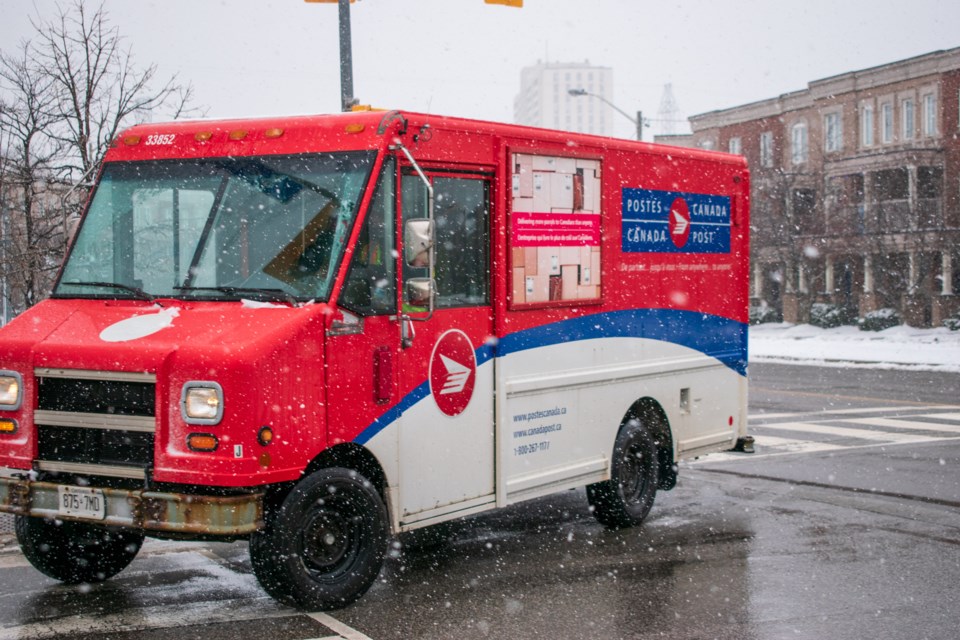Nicole Hannah is preparing to tell her two teenage kids that their Christmas presents won’t be coming this year – not on time, at least, as the postal strike drags on.
Ms. Hannah had ordered all the big presents just before the strike – a new Xbox for her son, beauty products from Sephora for her daughter – but they still haven’t arrived. Now, for someone like her living in Yellowknife, there are no real alternatives to Canada Post.
“If you go online to go buy anything, it’ll say you’re fine, unless you have a PO box or you live in a northern community,” says Ms. Hannah, who works in health and social services for the government of the Northwest Territories. “I was kind of keeping my fingers crossed that this would be resolved before I would have to explain it. But it doesn’t look like that’s going to happen.”
The Canada Post workers strike that has put approximately 55,000 members of the Canadian Union of Postal Workers on the picket lines since Nov. 15 has hit people and businesses in northern and remote communities especially hard. Canada Post says in its 2023 annual report that it had 280 contracted flights into northern and remote communities and that its market share for parcel delivery in small and rural areas is 40 per cent higher than in urban areas.
For many of those communities, Canada Post is the only way to get not only Christmas presents but many of life’s essentials, from diapers to medication.
“It’s kneecapped us. It’s kneecapped pretty much everybody in small areas like this,” says Brenda Guthrie, a stay-at-home mother who lives in Destruction Bay, a community of approximately 40 people in the Yukon.
It is a three-hour drive from Ms. Guthrie’s home to Whitehorse, and another three hours back. That is why everything from medications to daily goods are ordered online and delivered by Canada Post.
Even if Ms. Guthrie made the drive to Whitehorse, she doesn’t expect there would be much left in the way of gifts for the season. People have most likely cleaned out the stores.
“Christmas is cancelled for almost everybody up here,” Ms. Guthrie says. “COVID was bad enough for everybody up here, but this has really mentally broke a lot of people.”
Ms. Guthrie is reminding herself that she and her husband and their two teenage kids are fortunate – they have a roof over their heads and food in the cupboard, she says, but it’s still been “a real mental kick.”
Adding to that mental strain is the fact that Ms. Guthrie usually gets the inhalers for her asthma delivered from the pharmacy in Whitehorse by Canada Post.
“I’m having to ration puffers until we can get to town, because we only go to town every two to four months,” she says.
There’s always the chance a neighbour might be able to help her.
“If somebody’s going to town, you try and see if you can find somebody who’ll pick it up for you. Like in the north, everybody helps one another,” Ms. Guthrie says.
Just as so many people in northern communities depend on Canada Post to get items to them, businesses and entrepreneurs depend heavily on it to deliver products to customers.
“We only have Canada Post. Businesses in southern Canada can pivot. Even businesses in Whitehorse can pivot a little more. But it takes a lot for a small manufacturing business like mine in a remote rural community to be able to pivot,” says Joella Hogan, founder of the Yukon Soaps Company, in Mayo, a village more than 400 kilometres from Whitehorse.
Last week, Ms. Hogan temporarily shut down orders on her website because of the frustration of not being able to ship products at a time of year when she relies heavily on increased sales.
“We see our biggest sales on our website before Christmas,” she says.
She could drive to Whitehorse to ship products through UPS or another company, but that would mean a four-hour trip each way.
“And, I mean, today it’s minus 32 so you’re putting yourself at risk by travelling on the highway,” Ms. Hogan says. “We’re losing thousands and thousands of dollars by this strike.”
There has been little apparent progress in negotiations in recent weeks in a prolonged labour dispute that has focused in large part on parcel delivery on weekends. Canada Post wants to drastically increase the number of part-time workers to conduct weekend delivery, which is opposed by the Canadian Union of Postal Workers.
Canada Post presented what it described as a “framework” to end the dispute over the weekend. While the CUPW said the proposal brought negotiations closer to its position, the union also said it was too far from something members could ratify.
In a letter sent to Labour Minister Steven MacKinnon and Public Services Minister Jean-Yves Duclos asking for the federal government to intervene in the strike, the Canadian Chamber of Commerce said the strike is damaging Canada’s retail sector and is having “considerable impacts on northern, rural and remote communities.”
Ms. Hannah says she supports the union, but worries about her children, who have been through so much these past few years. First, there were all the hardships of the pandemic. Then last year, the City of Yellowknife went on strike, which closed down all the sports facilities, so all her kids’ extracurricular activities were taken from them. Shortly after that, the family was evacuated to Edmonton because of the forest fires.
“It’s a bit heartbreaking,” Ms. Hannah says.




